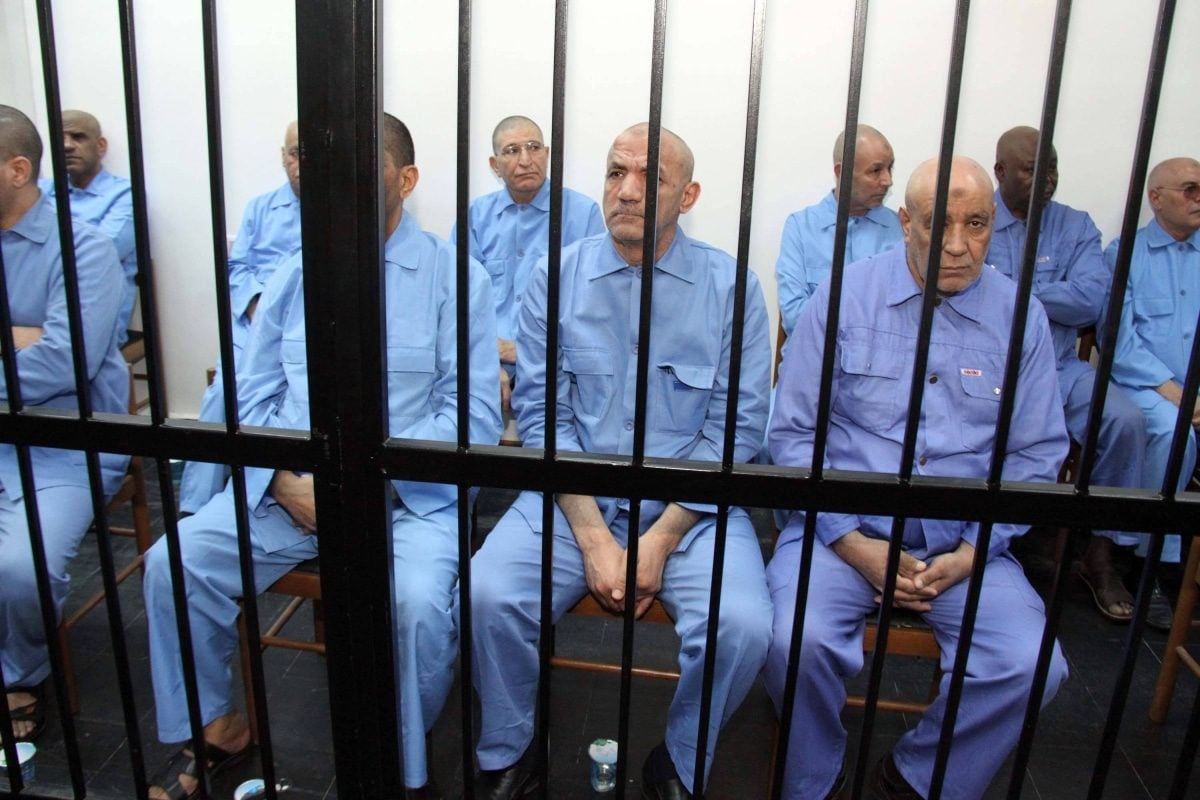
By sentencing to death Seif al-Islam Gaddafi and other important members of his father’s regime in July 2015, the authorities of the government in Tripoli (as opposed to the government in Tobruk) were sending a clear message to the international community: we are here for war, not peace.
Muammar Gaddafi built his regime over forty years, from 1969 to 2011. During his decades in power, he built schools, roads, and cities and developed a welfare state that distributed some of the oil revenues to the people, but he was a brutal dictator and an eccentric one. Gaddafi’s jails were among the worst in the Arab world, and criticizing his regime could lead to death. Torture was widespread, and thousands lost their lives after his September Revolution. The circles close to him and his family became rich and powerful.
The international community boycotted and vilified Gaddafi for years until he reversed himself and joined the “war on terror” (2004). He then gradually regained international recognition, which climaxed in his rapprochement with Italy’s prime minister Silvio Berlusconi, France’s president Nicholas Sarkozy, and British prime minister Tony Blair. Troops from France and Italy even marched during his 2009 military parade in Tripoli, commemorating the fortieth anniversary of his rise to power.
The 2011 revolution, however, turned everything upside down. His brutal crackdown on the opposition and the threats that he and his son Seif al-Islam made against the demonstrators raised red flags. Americans and Europeans, even though on good terms with him by that time, never found him reliable nor his regime sustainable, and they decided to join some Arab states in an attack on Libya. The crimes Gaddafi committed in the period between February and October 2011 were well documented, on film and otherwise. It was bloody, dirty, and cruel, and Gaddafi’s forces were accused of war crimes. The International Criminal Court (ICC) in The Hague soon stepped in with sufficient charges to launch a trial.
Gaddafi’s Jamahiriya was not one man: it was a clientelist regime, a network. For those who stood against them, the group around Gaddafi—at first loyalists from the army and young revolutionaries and then his sons, as they grew up, along with their clients—was collectively responsible for the woes of the country. The international community largely accepted this view.
Gaddafi and one of his sons, Moatassem Billah, were killed on 20 October 2011. In the weeks leading up to his assassination, other figures lost their lives as well, while many defected and were largely left unharmed. But many were caught by the Thuwwar (“Revolutionaries”) in 2011 and 2012.
Unfair Trials
At first, everyone seemed to have one enemy: Gaddafi’s regime. Once it collapsed, conflicts emerged, rebel militias refused to disband and hand in their weapons, and the situation in the country went into an increasingly fiery spiral until the nation split in 2014.
Whatever crimes Gaddafi’s affiliates had committed, it became clear from 2011 onwards that they would not receive a fair trial in Libya. The fate of one prisoner indicated, from the beginning, that something was going wrong. Seif al-Islam, the leader’s favorite son and his rumored successor, was arrested a few days after his father’s death as he was trying to flee the country. Those who caught him were Thuwwar from the Zintan region, in Libya’s southwest. They paraded the fallen prince in front of cameras and people, and it was said that they cut off his fingers to torture him.
But when Tripoli, then the only central government, asked for him to be handed over, the Zintanis refused. Even when the ICC asked, his captors refused. Later, videos of him in jail were smuggled out, in which he seemed much calmer and even revered by his prison guards. As years went by, Zintan evolved from a staunch revolutionary city to a pro-Tobruk stronghold. In Libya’s de facto split of 2014, Zintan became Tobruk’s enclave in the west, in the heart of Tripoli’s zone of influence. Tobruk is considered a pro-Gaddafi government.
So, when a Tripoli court sentenced Seif Gaddafi to death, it was in absentia. He was well protected in his Zintan “golden jail.” The condemnation was therefore symbolic. In fact, Libya’s judiciary, whether in Tobruk or in Tripoli, lacks independence and faces constant pressure from the militias ruling the country. The message that Tripoli sent to its foes and the international community was that they were not ready to compromise and would move forward with the plans they had drafted.
While Saif al-Islam Gaddafi is relatively safe, other high-level figures of his father’s Jamahiriya are not. The most notable ones in prison in Tripoli are Libya’s former top spy, Abdullah Senussi, the last prime minister of Libya, Baghdadi al Mahmoudi, and Gaddafi’s younger son, al-Saadi. The two old men are stuck in jail and are now awaiting execution, which may happen at any time. In August 2015 a video surfaced of al-Saadi Gaddafi being tortured by his jailers.
Libya is divided in two, with many regions beyond the control of any state. In the meantime, the affiliates of the Islamic State (IS) are expanding, while the economy is collapsing. The international community, represented by the United Nations, has been conducting a series of talks in several countries and requiring that the various protagonists, affiliated with either Tobruk or Tripoli, sit down at the same table.
Yet some parties refused to abide by the peace process and vowed to continue the fight. On Tobruk’s side, it is General Khalifa Hafter and his militia-turned-army that continue fighting and bombing in Benghazi and near Tripoli. On Tripoli’s side, it is mainly the extremist fighters from Misrata who coalesced behind Salah Badi’s al-Sumud Front.
The latest decisions of the Tripoli court fit with the projects of Badi and the likes. If they are carried into effect, it will only add more fuel to the raging war.
That is also what Haftar, the Tobruk hawks, and IS are waiting for.


